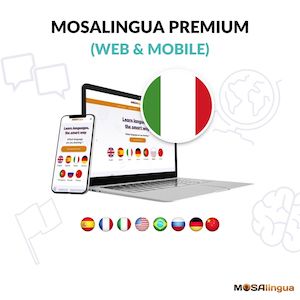If you’ve always been fascinated by the Italian language and wish to pursue exciting career opportunities in Italy and abroad, then an Italian language certificate can make your dreams a reality. If you are fluent in Italian, there are many things you can do with the language of the “Bel Paese.” You can become a teacher, request citizenship, or apply for a variety of rewarding careers that are right at your fingertips. Let us help you learn how you can get the B1 level Italian language certificate.

Everything You Need to Know About Getting an Italian Language Certificate – B1 Level
What are the levels of Italian?
As a reminder, the Common European Framework of Reference for Languages establishes six different levels of knowledge of a foreign language:
- A1: Beginner
- A2: Elementary
- B1: Intermediate
- B2: Upper Intermediate
- C1: Advanced
- C2: Proficient
What do I need to learn to reach the B1 level?
Here’s a list of the grammatical concepts and other skills you need to master to reach a B1 level in Italian. Once you do, you can feel confident signing up to take an exam to certify your level:
- Definite and indefinite articles
- Comparative and superlative adjectives
- Personal, reflexive and relative pronouns
- Possessive, demonstrative and interrogative adjectives and pronouns
- Indefinite adjectives and pronouns
- Articulated prepositions (preposizioni articolate) – prepositions that take on a different form when they are combined with articles
- Conjugation of regular verbs (present, imperfect, preterite perfect, imperative and conditional)
- And last but not least, common adverbs of time, place and quantity
In addition to the skills mentioned above, the B1 Italian exam also tests you on all of the competencies of the previous levels (A1 and A2).
B1 level = Independent user
When you can manage everyday situations in spoken and written Italian, you are considered an independent user of the Italian language. This means that you are at an intermediate level, which is the B1 Level of the Language Certificate.
How to Pass the Italian Language Exam
The Italian language B1 exam will cover different grammatical and morphosyntactic elements, such as pronouns, adjectives, adverbs, prepositions, and verb tenses. In addition, on the B1 exam you will be tested on the A1 and the A2 content.
There are several different ways to get your language certificate.
The MosaLingua app
One of the easiest ways to expand your knowledge in Italian is with the MosaLingua app. This app is a fun, exciting, and easy way to master your Italian language skills in no time! The great thing about using the MosaLingua app is that you can complete different courses, and receive a digital certificate proving how much you have learned. You can even print your certificate and present it as proof of your skills in the Italian language.
Parlando Italiano courses
Parlando Italiano presents easy-to-learn courses in which you can sharpen your Italian language skills. The great thing about this learning centre is that you can take Italian courses online with friendly tutors. If you prefer face-to-face classes, those are available, too! You can take private Italian language classes in Spain and in the UK.
During a private class, your teacher will create a fun learning environment. When you feel relaxed, you’ll grasp the language so much faster. Once you have completed the course, you will take an exam. If you pass, you’ll receive your certificate.
With your new B1 level Italian language certificate, the world is your oyster. You can impress a future employer with your newly acquired language skills by adding your certificate to your resume.
Italian Certificates for Citizenship and State Examinations
Gaining an Italian language certificate certainly provides a competitive advantage in the professional world. Obtaining a B1 Italian language certificate online or by taking classes is easy, affordable, and convenient. However, if you need international recognition for citizenship or another purpose, you will need an official certificate.
The CILS B1 Italian Certificate
The CILS Certificate, or the Certificazione di Italiano come Lingua Straniera, is a rewarding certificate. It is accredited by Siena University for foreign students. You can choose different certificates depending on your needs and the reason you need a qualification. These include:
- CILS B1 (for adults)
- CILS B1 Teens (for students ages 14-18)
- and CILS B1 Citizenship (for students who are applying for Italian citizenship)
You can take the CILS exam in June or December.
Once you pass the CILS exam, you will get your B1 certificate. To qualify, you need to score at least 11 points in each of the 5 tests, from listening and reading comprehension to written skills. The test totals 100 points and you can retake certain sections after 18 months if you don’t achieve the minimum score. This gives you another chance to earn your certificate without having to retake the entire test.
The CELI Certificate
The Certificato di Lingua Italiana, or CELI Certificate, is an official certificate for learning Italian, accredited by the University of Perugia. You can choose from a variety of CELI certificates including some that correspond to a B1 level:
- CELI 2 (for adults)
- CELI 2a (for students ages 12-18)
- and CELI 2i (for students who are applying for Italian citizenship)
With some hard work and knowledge, you can learn just how to pass the CELI Exam.
The PLIDA B1 Italian Certificate
Next, if you are interested in the PLIDA Certificate, the Progetto Lingua Italiana Dante Alighieri, you can easily take the exam at any of the more than 350 accredited centers around the world. It is provided by the Società Dante Alighieri and there are different types of B1 exams that you can take. These include:
- PLIDA B1 (for adults)
- PLIDA B1 Junior (for ages 13 to 18)
- and PLIDA B1 Citizenship (for students who are applying for Italian citizenship)
The PLIDA exam can be taken on one of the 4 available dates throughout the year.
The Cert.IT
You can also consider the Cert.IT as a B1 Level Italian Language Certificate. The Cert.IT, granted by Università degli Studi Roma Tre, is recognized internationally, too. The only inconvenience is that there are fewer accredited centres in foreign countries than for the CILS, CELI, and PLIDA exams.
Tips for Preparing for the B1 Level Italian Certificate Exams
So you’ve decided that the B1 level Italian language certificate is the qualification for your needs! Now what? Start by practicing with a course that suits your learning style.
Practice for a B1 Italian certificate with an app
The MosaLingua app makes it easier and faster than ever before to improve your Italian language skills. With its user-friendly features, you can access the app wherever you go, which means you are constantly mastering your Italian language level. You can learn a range of vocabulary and memorization techniques so you can pass the exam with confidence.
There are also many online resources to help you in your studies and in communicating in Italian. How about watching a movie in Italian with subtitles or reading a book or general article in the popular language? Expand your horizons and learn as much about the uniqueness of Italian culture. You can do all of this from the app on your smartphone or on your computer.
Learn with a tutor
Learning is made easy with the tailored lessons provided by your very own Italian tutor. All you have to do is sign up for the Parlando Italiano language centre. Then you’ll have access to online lessons and private tutoring in the comfort of your very own home.
After you have achieved the B1 level of Italian, find an accredited centre nearby and sign up to take the exam. Enrollment usually closes a month to a month and a half before the official test.
Practice with former exams
You can easily download samples from former exams so you can familiarize yourself with the types of questions asked. These range from comprehension to written language. Keep in mind that the B1 exam for Citizenship is slightly different from the Standard B1 exam. Practice with the same exam that you plan to take.
It is a good idea to get as much practice for the exam as you can. For the B1 level, you must have good Italian language skills and be able to manage your time for the exam. With practice, you will notice improvements in your scores.
In conclusion, put your all into your studies. The more time you dedicate to studying the more prepared you are. We hope this article on how to get the B1 level Italian language certificate has answered your questions! Feel confident enough to pursue your goals and dreams by equipping yourself with knowledge of the Italian language. Finally, if you put in the hard work you will reap incredible rewards!
About the Author: Valeria Biancalani is the founder of Parlando Italiano, an Italian school that offers Italian lessons with native and qualified tutors. Parlando Italiano has been an official centre for CILS exams since 2018.
Related posts:
Start improving your Italian today
Good news: we can help!
More good news: you can get started for free! With your free trial, you can test drive the most effective method for learning Italian for the next 15 days!
Vocabulary flashcards, videos with subtitles, audiobooks, articles adapted to your level – with MosaLingua Premium (Web & Mobile), you’ll have access to all this and more. Get started right now. It’s free—and risk-free—to try!







my challenge is I am 88 years old [ born 1935 ] …..without any experience of the Italian
language except attending a local publicly funded evening class for seniors [with a tutor]…..not a teacher. I am interested in your reaction and advice as I am keen to learn some Italian……my ambition is to retire {???} to Italy
Hi Kevin,
Retiring in Italy sounds like dream come true!
At your level (beginner, but with some knowledge of the language), for the moment, I’d recommend you start with easy podcast made for beginners as well as learning some vocabulary.
We do happen to have a product for this:
MosaSeries is a story of a young man who wakes up in a hospital without knowing who or where he is.
This captivating narrative progresses in difficulty, using more and more complex words as the story evolves.
You’ll also benefit from short grammar lessons, and can use it alongside our mobile apps to learn vocabulary more efficiently.
If you’re not able to yet, you’ll be able to start watching TV shows and movies by the end of this series.
Buon apprendimento!
Samuel W
– MosaSpeak was designed for individuals who are interested in improving their spoken skills.
It was made to help those who have trouble expressing themselves in the language, for reasons ranging from shyness to phonetic obstacles.
Because it is pronounced so differently, people learning this language often have a hard time when it comes to expressing themselves and practising out loud what they’ve already learned.
This is because traditional learning method don’t focus enough on proper pronunciation and phonetics.
That’s why we designed this course, to help you discover the sounds, accents and phonetic rules, so that you can better express yourself and communicate more effectively. You can find more details about MosaSpeak here:
https://academy.mosalingua.com/mosaspeak-sales-page-ww?target_lang=es&save_target_lang
– MosaTraining was designed to help you learn and master the most effective methods and techniques used by polyglots for learning languages online.
In this way, it’s not like a standard language course.
Instead, it focuses on the methodology for learning a new language, so that you won’t have to resort to traditional language courses at all.
This course is primarily aimed at those with a beginner, novice or intermediate level, and is a perfect companion to our mobile apps.
It allows you to go even further than simply learning vocabulary, by focusing on specific skills like oral comprehension, phonetics, speaking and writing, reading and written comprehension, etc.
We’ll cover a number of different methods, techniques, and tricks for learning a new language and making consistent progress. Over the course of three months, you’ll receive a series of learning modules with lessons and practical exercises.
If your goal is to improve any of these skills, and you have a little more time to dedicate to learning your target language, we highly recommend this training course.
You can find more information about MosaTraining here:
https://academy.mosalingua.com/mosatraining
Hoping this has helped!
Samuel W